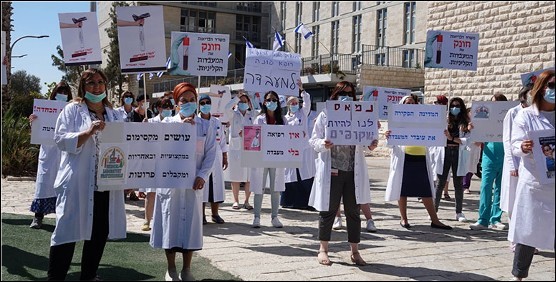Eight days of strike action by technicians at publicly-funded testing labs ended Sunday evening, September 6, after an agreement was reached with the Health and Finance ministries that will include a wage increase for workers. The final details of the agreement are to be ironed out in the coming days, a statement said, but noted it will include a wage increase for all lab technicians.

Public lab workers demonstrate outside of the Hadassa Medical Center in Jerusalem on August 22, eight days before they began their strike. (Photo: Union of Biochemists, Microbiologists and Laboratory Workers)
The Union of Biochemists, Microbiologists and Laboratory Workers announced in its own statement that the breakthrough came during a meeting between Histadrut labor federation chairman Arnon Bar-David and representatives of the two ministries, held at his office. Around 2,000 laboratory workers at some 400 labs started an open-ended strike on August 30 due to a pay dispute with the treasury. Lab technicians said they are paid a fraction of what workers doing the same job at private clinics get, creating an unfair disparity that also makes it difficult to attract or retain workers, resulting in their being overworked.
The union’s original requests included a starting salary of at least 50 Shekels per hour; an end to the rampant privatization of laboratory testing; a change in the operating schedule of the labs; and a plan to correct deficiencies that were addressed in a recent State Comptroller’s Report.
During the strike, workers at publicly-run laboratories only provided emergency diagnostic services to public hospitals and only for departments such as intensive care, emergency rooms and maternity wards. Tests were not processed for patients awaiting release from hospital, or for those before non-essential surgery.
Israel has been carrying out up to 30,000 virus tests a day as it faces a second wave of infections that over the weekend took the national toll past the grim mark of 1,000 deaths since the start of the pandemic and last week saw a record of over 3,000 cases diagnosed in a single day. Israel last week also achieved the dubious distinction of achieving the highest daily increase of new coronavirus infections per capita in the world, according to data from Johns Hopkins University, with an average of 199.3 new cases a day per 1 million residents during the week ending September 2. As of Sunday morning, September 6, there were 26,232 active patients in Israel, 445 of whom were in a serious condition, with 119 on ventilators. The number of deaths from COVID-19 stood at 1,010.
Related:


